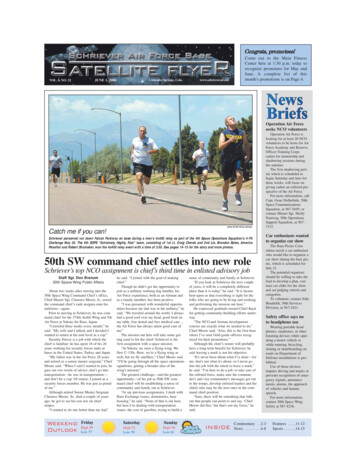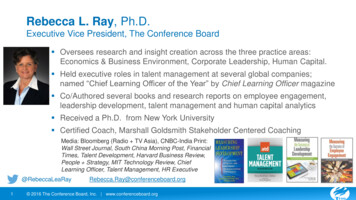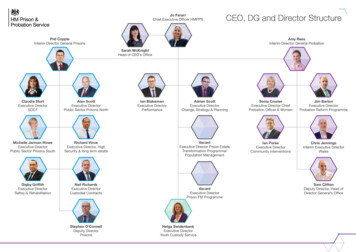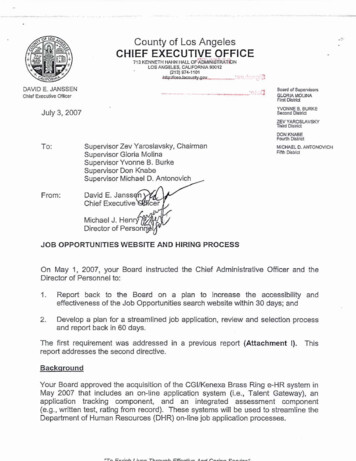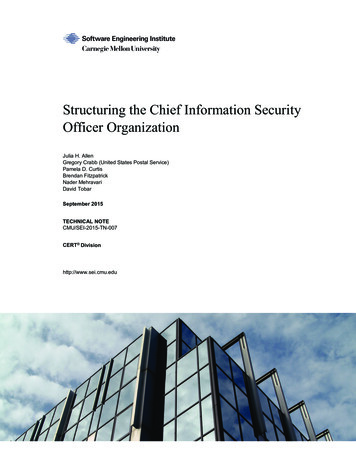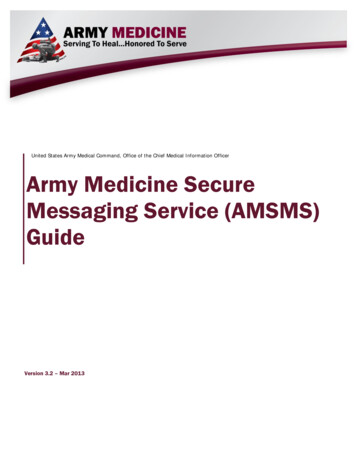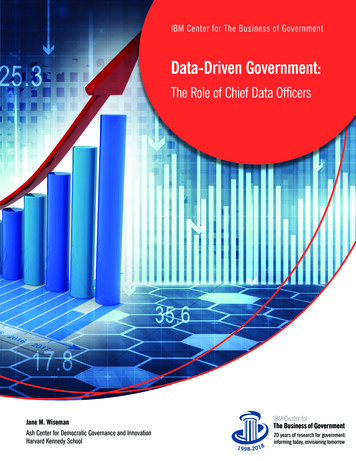
Transcription
IBM Center for The Business of GovernmentData-Driven Government:The Role of Chief Data OfficersJane M. WisemanAsh Center for Democratic Governance and InnovationHarvard Kennedy School
Data-Driven Government:The Role of Chief Data OfficersJane M. WisemanAsh Center for Democratic Governance and InnovationHarvard Kennedy School
Data-Driven Government:www.businessofgovernment.orgTABLE OF CONTENTSForeword. . . . . . . . . . . . . . . . . . . . . . . . . . . . . . . . . . . . . . . . . . . . . . . . . . . . . . . . . . . 4Executive Summary . . . . . . . . . . . . . . . . . . . . . . . . . . . . . . . . . . . . . . . . . . . . . . . . . . . 5Creating A Data-Driven Federal Government. . . . . . . . . . . . . . . . . . . . . . . . . . . . . . . . . . 8Introduction. . . . . . . . . . . . . . . . . . . . . . . . . . . . . . . . . . . . . . . . . . . . . . . . . . . . . . 9The Landscape: Where Federal CDOs Are Today . . . . . . . . . . . . . . . . . . . . . . . . . . . 16Profiles Of Pioneering CDOs In The Federal Government. . . . . . . . . . . . . . . . . . . . . . . . 22Profile One: U.S. Agency for International Development CDO Brandon Pustejovsky—An Open Data Leader and Data Culture Change Agent . . . . . . . . . . . . . . . . . . . . 23Profile Two: Department of Transportation CDO Dan Morgan—A Data InnovationCatalyst . . . . . . . . . . . . . . . . . . . . . . . . . . . . . . . . . . . . . . . . . . . . . . . . . . . . 29Profile Three: General Services Administration CDO Kris Rowley—An Enabler ofEnterprise-Wide Analytics. . . . . . . . . . . . . . . . . . . . . . . . . . . . . . . . . . . . . . . . . 33Profile Four: Health and Human Services, Office of Inspector General (HHS OIG) CDOCaryl Brzymialkiewicz—A Focus on the Customer and Delivering Value . . . . . . . . 38Profile Five: Federal Aviation Administration (FAA) CDO Natesh Manikoth—A PlatformCreator Who Generates Interest in Data . . . . . . . . . . . . . . . . . . . . . . . . . . . . . . 43Putting The CDO In Context . . . . . . . . . . . . . . . . . . . . . . . . . . . . . . . . . . . . . .The CDO Is a Key Player in the Technology, Data, and Innovation Landscape.Public Sector CDO Organizations: Two Models. . . . . . . . . . . . . . . . . . . . . . .Insight for Federal CDOs from Beyond the Beltway. . . . . . . . . . . . . . . . . . . .46475052Recommendations . . . . . . . . . . . . . . . . . . . . . . . . . . . . . . . . . . . . . . . . . . . . . . . . . . . 59Conclusion. . . . . . . . . . . . . . . . . . . . . . . . . . . . . . . . . . . . . . . . . . . . . . . . . . . . . . . . . 67Acknowledgements. . . . . . . . . . . . . . . . . . . . . . . . . . . . . . . . . . . . . . . . . . . . . . . . . . . 68Appendices . . . . . . . . . . . . . . . . . . . . . . . . . .Appendix 1: Research Methods . . . . . . . . .Appendix 2: States with CDOs. . . . . . . . . .Appendix 3: CDOs in the 10 Largest CitiesAppendix 4: City CDOs—Quick Facts . . . . .696970. 7172References. . . . . . .Articles. . . . . .Presentations .Interviews . . . .74747677.About the Author . . . . . . . . . . . . . . . . . . . . . . . . . . . . . . . . . . . . . . . . . . . . . . . . . . . . 78Key Contact Information. . . . . . . . . . . . . . . . . . . . . . . . . . . . . . . . . . . . . . . . . . . . . . . 79Reports from the IBM Center for The Business of Government. . . . . . . . . . . . . . . . . . . . 803
Data-Driven Government:IBM Center for The Business of GovernmentFOREWORDOn behalf of the IBM Center for The Business of Government, we are pleasedto present this report, Data-Driven Government: The Role of Chief DataOfficers, (CDOs) by Jane Wiseman, Harvard Kennedy School.Governments at all levels have seen dramatic increases in availability and use ofdata over the past decade. For example, this increase was demonstrated at thecity level in a 2016 IBM Center report by Alfred Ho, Ten Actions to ImplementBig Data Initiatives: A Study of 65 Cities, which describes the active use of datato improve city operations and decision-making.The push for data-driven government currently has intense interest at the federallevel, as the US Government develops an integrated federal data strategy thatdrives a cross-agency priority goal to “leverage data as a strategic asset.” Andpending federal legislation would require agencies to designate chief data officers.DANIEL J. CHENOKThis report focuses on the expanding use of data at the federal level, and governance frameworks to manage data most effectively. Ms. Wiseman says: “The purpose of this report is to advance the use of data and data security in governmentby describing the work of pioneering federal CDOs and providing a framework forthinking about how a new analytics leader might establish his or her office anduse data to advance the mission of the agency.”Ms. Wiseman’s report provides rich profiles of five pioneering CDOs in the federalgovernment and how they have defined their new roles in making their agenciesmore “data-driven.” Based on her research and interviews, she offers insights intothe evolving roles of agency CDOs in different agencies, and the reasons agencyleaders have established these roles to improve agency capacity for leveragingdata effectively. She also offers advice on how new CDOs can succeed in thiseffort at the federal level, based on the experiences of these federal pioneers aswell as successful state and local CDOs.ZBYNEK KROBOTThis report continues the Center’s longstanding area of research into how government can leverage data to carry out missions and deliver services more effectively,dating back to our four-part Data to Decisions series published with thePartnership for Public Service.We hope these insights and recommendations provide government leaders a roadmap to help their agencies become more data-driven.Zbynek KrobotPartner, Digital, Shared Services, Strategy &Performance AnalyticsIBM Global Business Serviceszbynek.krobot@us.ibm.comDaniel J. ChenokExecutive DirectorIBM Center for The Business of Governmentchenokd@us.ibm.com4
Data-Driven Government:www.businessofgovernment.orgEXECUTIVE SUMMARYThe idea of using data to make decisions in government is notnew; it’s just getting increased attention now, in the age of “bigdata,” and with the mention of a federal data strategy in thePresident’s Management Agenda.As agencies become increasingly data-driven, the rapid acceleration of the volume of dataavailable has generally exceeded the pace of growth in the ability of government to manageand use that data to make decisions. Many government agencies are awash in data but struggling to analyze and make sense of it. The exception is in cases where a government agencyhas appointed a leader to manage the transition to a data-driven culture.While there are many roles in government that relate to data—data analysts, data scientists,performance officers, evaluation officers, etc.—one key role is becoming increasingly commonbut is not yet well-studied: the Chief Data Officer (CDO).The past few years have witnessed the appointments of an increasing number of CDOs in government. As their ranks grow, there is little roadmap for success—both for how these key drivers of data-driven government should successfully execute their missions and how they shouldsupport an ecosystem of government excellence and innovation.The purpose of this report is to advance the use of data in government by describing the workof pioneering federal CDOs and providing a framework for thinking about how a new dataleader might establish his or her office and use data to advance the mission of the agency.While the focus of this report is on those with the official title CDO, the insights apply as wellto all leaders seeking to advance data-driven government.With the possible passage of legislation requiring every federal agency to hire a CDO, and withthe 2018 President’s Management Agenda calling for a federal data strategy, it is timely togather existing best practices and promising approaches to inform the data-driven governmentefforts of any future CDOs in the U. S. federal government.When interviewing CDOs in federal agencies, along with other data and analytics experts, anumber of key insights emerged about the current environment and the key factors for successfor CDOs in government.Observations About the Current Environment for Federal CDOs Federal CDOs are few relative to the size of the federal government. While there aremany pockets of data and innovation excellence across the federal government, particularlyin the scientific and statistical agencies, there are few people with the official title of CDOat the department or bureau level. Most the largest federal agencies lack enterprise-widedata leadership, with only three cabinet-level CDOs among the 10 largest agencies. Thismeans that CDOs are far less common in federal than in state and local government. Current CDOs are doing excellent work. Those federal CDOs who are in place excel at levels to be admired across both the public and private sectors. Successes range from predic5
Data-Driven Government:IBM Center for The Business of Governmenttive analytics models to root out fraud to transformational open data programs that providelarge volumes of high-quality data for assessing government results. Many current federalCDOs have been in their positions for several years, far surpassing the average tenure ofCDOs in city and state government, providing a strong foundation for continuous improvement and talent development. They have assembled highly capable teams and deliveredimportant results for their agencies—including, in one case, a documented return oninvestment of 5 for every 1 in staff cost. These CDOs use creative staffing and procurement models, and they find innovative ways to partner with state and local government. Operating models are diverse. No two federal CDOs share the same portfolio of responsibilities, as each one has adapted the role to the unique needs of his or her agency.Federal CDOs view themselves as enablers of data-driven decision-making capacity intheir organizations and execute on that in different ways, ranging from being centralizedproviders of “analytics as a service” to creating the tools and platforms that enableemployee self-service across their departments.Observations About Conditions That Enable a Federal CDO to BeSuccessful Executive support amplifies success. CDOs are most successful when they have the fullsupport of their senior executives and are able to leverage that authority when necessary.A high-profile mandate helps them gain credibility and the respect of their peers. Clarity of purpose keeps the team focused. Successful CDOs are clear about their scopeand can describe their goals succinctly. This is enormously helpful in motivating andfocusing the efforts of staff and in avoiding “scope creep” or misunderstandings about themission. Data teams do best when they tap diverse skills. CDOs are successful when they buildand deploy teams with a range of specialized skills. The CDOs profiled in this report havethought carefully about the skills and resources needed to accomplish their mission—insome cases, revising their organizational structure as they learn from experience.The Keys to Having an Impact as a CDO Solving high priority customer problems makes value visible. Each CDO described theimportance of listening to the owners of business processes in their agencies, and mostengage in direct one-on-one conversations with leaders to fully understand their challenges as well as how data can help resolve pain points in their operations. Investments in data governance and data literacy fuel culture change. One commontheme among successful CDOs was the importance of data governance and the improvement of data quality. Efforts at improving data literacy were common across all of theCDOs interviewed, highlighting the importance of their roles as enterprise-wide culturechange agents. The most impactful projects span boundaries. A department-wide CDO is in the uniqueposition to connect data across the enterprise, and often to connect to data outside theorganization as well. This can amplify the value of data. For example, the Department ofTransportation facilitated cross-agency development of a standard federal data schema forthe National Address Database, now adopted by 22 states.6
Data-Driven Government:www.businessofgovernment.orgThe Three Core Competencies of Successful CDOsA successful CDO is one who can balance a vision for new ideas with the ability to get thingsdone. CDOs who excel in each of the three dimensions described below are most likely toachieve success. Infrastructure competence: At a minimum, a CDO must competently manage the basicdata infrastructure of the organization, supporting open data and data visualization platforms and maintaining the data warehouses and tools needed for the organization. Theseoperational “nuts and bolts” form the core of what a CDO must do well. Openness to innovative ideas and approaches: A great leader is open to pushing his or herorganization forward, to innovation, to new ways of thinking, and to new methods andtools. Each of the CDOs profiled here has nudged his or her organization along the journeytoward data-driven government while keeping an open mind and being able to adapt tochanging opportunities. Delivery capability: While openness to innovation makes for a visionary leader, the visioncan only be realized with consistent attention to delivery. This is an often-overlooked butcritically important element to success.Recommendations Recommendation One: The Office of Management and Budget (OMB) and Congressshould recognize the value of federal CDOs and give them the appropriate resources.This would include requiring that CDOs be full-time positions with the authority andresources to drive data-driven government for their organization, provide them authority tofacilitate the sharing of best practices, establish a regular intergovernmental data dialog,and supporting the development of widespread data literacy. Recommendation Two: Federal agency leaders should establish a data leader or CDOposition in their agency. Every leader of a government agency, regardless of the agency’ssize or mission, should consider the value that could be achieved for the public by hiring adata leader such as a CDO. The data leader should have the authority, executive support,and mandate to advance data-driven government. Agency leaders should hire a dataleader such as a CDO who demonstrates competency across the domains of infrastructure,innovation and delivery. Recommendation Three: New CDOs should let strategy drive operations and shouldfocus on delivering value for their customers. An agency’s business challenges shoulddrive CDO work, and CDO teams should solve the most important public problems, asexpressed by the managers and executives in the organization. Recommendation Four: CDOs should create a skilled and diverse team. A CDO shouldbring together specialists across disciplines such as business process analysis, data science, data management, and data visualization. In hiring, CDOs should not underestimatethe importance of people skills, and should use creative hiring strategies. Recommendation Five: CDOs should create a culture of data and innovation. A CDOshould be a data evangelist and advocate for data-driven government across the organization. He or she should build data literacy into culture change for the broader organizationand, within the team, allow staff the “freedom to fail.” Recommendation Six: CDOs need to deliver on analytics by getting the basics right andproviding data stewardship. A CDO needs to solve the problems that matter most to theirorganization’s customers, deliver timely and useful results in a customer-friendly format,and leverage existing tools and resources.7
Creating A Data-DrivenFederal Government
Data-Driven nThe Use of Data in Government is Gaining MomentumThe idea of using data to make decisions in government is not new; it’s just getting increasedattention now, in the age of “big data,” and with the mention of a federal data strategy in thePresident’s Management Agenda.Data-driven government has a long history, but a significant development was the 1970 creation of the OMB, tasked to measure the effectiveness of government and to bring that function into the budgeting process. The Government Performance and Results Act of 1993, andits successors over the past two decades, have tried to bring greater use of data into the process of managing the daily operations of the federal government as well as the allocation ofresources. Open data and digital data efforts in the 2010s have sought to increase transparency and improve access to government data for the public and for government managers.More recently, the velocity and variety of data initiatives in the federal government has accelerated. There is growing consensus that, as stated in a 2017 CIO Council report, “Efficientlymanaging government data and information can increase operational efficiencies, reducecosts, improve services, and better safeguard personal information.” 1Two forces have accelerated the use of data across all levels of government over the pastdecade—demonstrable results and democratization of data management and analysis.Demonstrable results have been seen in the success of performance “stat” and data analyticsprograms, particularly at the state and local level. As the big data revolution has drasticallyincreased the volume of data available to government and lowered the cost and complexity ofthe tools for storing and analyzing data, the field of data-driven government has grown toinclude a new class of leaders and managers who have the skills and interest to exploit thepower of data. Vast amounts of data that used to be inaccessible or unintelligible—perhaps inpaper files stored in different parts of the same building, or maybe in different buildings acrossthe country—are now easily combined and compared to gain insight. In short, data-drivengovernment is now possible on a scale impossible to contemplate a decade ago.Leadership Can Dramatically Accelerate Adoption of Data-Driven GovernmentThe rapid acceleration of the volume of data available has generally exceeded the pace ofgrowth in the ability of government to manage and use that data to make decisions. Manygovernment agencies are awash in data but struggling to analyze and make sense of it. Theexception is in cases where a government agency has appointed a leader to manage the transition to a data-driven culture.The Most Common Title for a Data Leader is Chief Data Officer (CDO)While they go by many different names—chief data scientist, chief data analyst, and so on,the most common title for thi
Data-Driven Government: iBm Center for the Business of Government . theme among successful CDOs was the importance of data governance and the improve-ment of data quality . Efforts at improving data literacy were common across all of the CDOs interviewed, highlighting the
